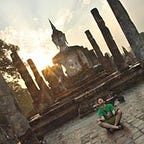Six books on eastern philosophy to help advance your UX career
Sometimes I keep myself busy thinking about what are the most influential experiences which have advanced my designer’s career in a deeper sense.
Among other things, I always think about these books, lessons and lectures which have profoundly changed my viewpoint on design, user experience, design thinking, or life, if you will.
Not only these pieces convey a similar message, which is paramount to “thinking differently or like a designer”, but these books can also help one advance in their lives to understand better their purpose, motivation and help oneself to feel better waking up every day, going to their work, school, or taking entrepreneurial endeavours.
Allow me to start with a bridge between the “western and eastern” thought, which is condensed in the work of Alan Watts.
This gentleman, who influenced the whole generation of 1960s and 70s synthesised in his work and lectures a wide variety of eastern thought spanning from Mahayana, Zen, Vedanta and Taoism, finding common themes and patterns which help one live a meaningful life.
Alan Watts, Out of your mind.
Why read/listen to this?
Alan is one of the key figures, among Timothy Leary and Ram Dass who influenced the 1960s Hippie movement.
He’s often referred to as to the dude who has brought eastern philosophy to the western audience.
Alan’s work is great as a starting point for anyone who finds himself curious, doubtful and willing to open their minds to see the world with a fresh eyes.
How does it help?
It’s indeed a mind blowing experience to see, how Alan synthesises and popularises eastern wisdom explaining it in a very popular and entertaining way. It helps any designer encourage curiosity and getting a mindset which stays for a lifetime. It gives one a method of inquiry on anything. Questioning everything is fundamental to user research in design and becoming senior in problem finding and problem definition.
Link: https://www.amazon.com/Out-Your-Mind-Essential-Listening/dp/1591791650
Shunryu Suzuki, Zen Mind, Beginner’s Mind.
Why read this?
Almost the Bible of innovation, this piece helps one establish a naive perspective and truly understand the value of it. Not only it gives one a guideline on how to become “pure” in its fundamental sense but also gives an insight on how motivation changes as we develop and grow.
How does it help?
The beginner’s mindset is fundamental to design on two levels. Both on the user research level, where we actually want to approach it with a “child’s curious and honest” perspective, as well as on the ideation level where we want to keep our mind open to new ideas without judgement.
https://www.amazon.com/Zen-Mind-Beginners-Informal-Meditation/dp/1590308492
Lao Tzu, Tao Te Ching.
Why read this?
This profound book of Taoism embodies in it a major part of eastern philosophy and wisdom as a whole. Wise, yet simple verses teach us basics of the “inner workings” of the world and explain the value of it.
How does it help?
“The more you know, the less you understand” is one of the quotes which still resonates in my mind. It tells us a great wisdom that thinking that we know is a great poison which limits the vast possibilities of our minds and screens out the fundamental compassion among spieces.
Empathy, or its higher form, compassion, is a skill which is needed for any user researcher who is eager to learn about their users.
https://www.amazon.co.uk/Tao-Te-Ching-Stephen-Mitchell/dp/0060812451
Erich Fromm, The Art of Loving
Why read this?
Erich Fromm has done a tremendous job explaining the various forms of love. Being compassionate helps us decide, what matters the most and drive focus of the user research outcomes.
How does it help?
Learning about love is profound to becoming a great designer. Why? By being able to distinguish between reasons of the heart and reasons of ‘getting something good out of it’ we are able to identify the basic human needs which will guide us through the noise of raw data of user research to the signals of what really matters to our users and makes them feel good.
It is not a ‘typical’ eastern philosophy book, however, it’s been greatly influenced by men, who tapped deeply into it, such as C.G. Jung and other sages of that time.
Sri Ramana Maharshi, Who am I?
Why read this?
This tiny book which in fact has only 11 pages dives deep into our selves. It actually doesn’t tell who we are, but who we are not and explains, how self-inquiry helps us liberate ourselves from the chains of our egos and suffering.
How does it help?
It is believed that the more ego, the less creativity and vice versa. This little book helps us realise this wisdom and guides us through these simple questions into this realisation.
‘Who am I’ is a masterpiece of simplicity and great intention of one of the greatest sages of modern Hindu thought.
https://www.amazon.com/Who-Am-Teachings-Bhagavan-Maharshi/dp/818801804X
Ram Dass, Remember, Be Here Now
Why read this?
This is a different kind of book and one almost has to feel it, rather than read it.
It’s a journey of a Harvard University professor Richard Alpert who went through a deep spiritual awakening and who was able to understand and pass along the wisdom of the eastern spiritual standpoint in a very unique way.
How does it help?
In my mind it especially helps user researchers to sort of see through things and understand how perception being projected to us by media or anybody else can be removed and how we can become authentic and really listening and open to one another.
Conclusion
This is indeed not a full list of influential literature which helps one becoming a more advanced UX designer or researcher, but in my view it’s a great basis which helps on the journey of becoming one.
Principles like, emptiness, curiosity, compassion, freedom, humility while understanding their deep real sense help us guide through the noise of everyday experiences towards becoming ‘better’ designers and essentially better human beings.
